 November 2013 in “Faculty Opinions – Post-Publication Peer Review of the Biomedical Literature”
November 2013 in “Faculty Opinions – Post-Publication Peer Review of the Biomedical Literature” Injecting CD34+ cell-containing platelet-rich plasma can improve pattern hair loss more than placental extract treatment.
 July 2012 in “Faculty Opinions – Post-Publication Peer Review of the Biomedical Literature”
July 2012 in “Faculty Opinions – Post-Publication Peer Review of the Biomedical Literature” Platelet-rich plasma can potentially increase hair growth and density, but more trials are needed to confirm its effectiveness and safety.
 September 2019 in “Journal of Investigative Dermatology”
September 2019 in “Journal of Investigative Dermatology” Researchers developed a 3D skin model with its own immune and blood vessel cells to better understand skin health and disease.
23 citations,
May 2013 in “Facial Plastic Surgery Clinics of North America” Autologous cell therapy can reduce facial wrinkles effectively.
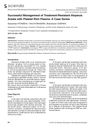 2 citations,
June 2019 in “Serbian Journal of Dermatology and Venereology/Serbian Journal of Dermatology and Venerology”
2 citations,
June 2019 in “Serbian Journal of Dermatology and Venereology/Serbian Journal of Dermatology and Venerology” Platelet-rich plasma injections can effectively treat stubborn alopecia areata.
81 citations,
January 2003 in “Journal of cosmetic and laser therapy” New techniques have improved acne scar treatment, but multiple tailored sessions are often needed.
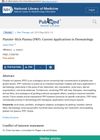 25 citations,
September 2019 in “PubMed”
25 citations,
September 2019 in “PubMed” Platelet-Rich Plasma (PRP) is helpful for skin and hair treatments and works better when combined with other procedures.
 5 citations,
November 2021 in “Plastic and Reconstructive Surgery”
5 citations,
November 2021 in “Plastic and Reconstructive Surgery” Using special stem cells, we can create new hair follicles, potentially making hair restoration easier and more affordable.
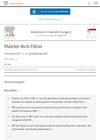 May 2022 in “Advances in Cosmetic Surgery”
May 2022 in “Advances in Cosmetic Surgery” Platelet-rich fibrin helps in healing and rejuvenation but results vary and can take time.
 January 2022 in “Springer eBooks”
January 2022 in “Springer eBooks” Using micrografts with stem cells and platelet-rich plasma can safely and effectively help regrow hair.
January 2008 in “Chinese Journal of Aesthetic and Plastic Surgery” Hair-derived material is safe and effective for skin filling.
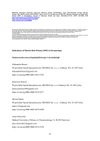 September 2023 in “Journal of Education, Health and Sport”
September 2023 in “Journal of Education, Health and Sport” PRP shows promise for skin and hair treatments but needs more research to confirm its effectiveness.
 April 2024 in “International Journal of Dermatology”
April 2024 in “International Journal of Dermatology” Filler injections can cause temporary hair loss, but hyaluronidase can help restore hair within a few months.
69 citations,
October 2013 in “Journal of Tissue Engineering and Regenerative Medicine” Current skin repair methods for severe burns are inadequate, but stem cells and new materials show promise for better healing.
 January 2016 in “Georg Thieme Verlag eBooks”
January 2016 in “Georg Thieme Verlag eBooks” More East Asians are accepting and getting facial plastic surgery, with a focus on natural-looking results and using both surgical and nonsurgical methods.
 45 citations,
May 2018 in “Stem Cell Research & Therapy”
45 citations,
May 2018 in “Stem Cell Research & Therapy” Using patients' own fat-derived cells to treat alopecia areata significantly improved hair growth and was safe.
 14 citations,
January 2021 in “Scientific Reports”
14 citations,
January 2021 in “Scientific Reports” Using micro skin tissue columns improves skin wound healing and reduces scarring.
 4 citations,
January 2015 in “Journal of clinical & experimental dermatology research”
4 citations,
January 2015 in “Journal of clinical & experimental dermatology research” PRP injections may slightly improve hair density and count for male hair loss, but more research is needed.
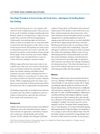 2 citations,
September 2019 in “Dermatologic Surgery”
2 citations,
September 2019 in “Dermatologic Surgery” The two-step procedure of fat grafting followed by hair grafting improves scalp and facial scar correction.
 58 citations,
January 2020 in “International Journal of Molecular Sciences”
58 citations,
January 2020 in “International Journal of Molecular Sciences” Different methods of preparing Platelet-Rich Plasma (PRP) can affect wound healing and hair regrowth in plastic surgery. Using a kit with specific standards helps isolate PRP that meets quality criteria. Non-Activated PRP and Activated PRP have varying effects depending on the tissue and condition treated. For hair regrowth, Non-Activated PRP increased hair density more than Activated PRP. Both treatments improved various aspects of scalp health.
 20 citations,
July 2020 in “Expert Opinion on Biological Therapy”
20 citations,
July 2020 in “Expert Opinion on Biological Therapy” Using micro-needling, low-level laser therapy, and platelet-rich plasma together significantly improves hair growth in people with hair loss.
 16 citations,
December 2016 in “Molecular Medicine Reports”
16 citations,
December 2016 in “Molecular Medicine Reports” Platelet-rich plasma may help hair follicle cells grow by affecting certain genes and pathways.
 14 citations,
March 2019 in “Journal of Cosmetic Dermatology”
14 citations,
March 2019 in “Journal of Cosmetic Dermatology” Activated platelet-rich plasma helps hair growth by boosting growth factors and cell growth pathways in hair cells.
 13 citations,
June 2019 in “Case reports in dermatology”
13 citations,
June 2019 in “Case reports in dermatology” Fat injections in the face can cause hair loss.
 9 citations,
September 2019 in “Clinical, Cosmetic and Investigational Dermatology”
9 citations,
September 2019 in “Clinical, Cosmetic and Investigational Dermatology” Using a patient's own fat tissue helped treat hair loss caused by an injury.
 4 citations,
August 2020 in “Applied Materials Today”
4 citations,
August 2020 in “Applied Materials Today” Hydrogel microcapsules help create cells that boost hair growth.
 4 citations,
August 2020 in “Facial plastic surgery & aesthetic medicine”
4 citations,
August 2020 in “Facial plastic surgery & aesthetic medicine” Combining growth factors with minoxidil improves hair growth more than minoxidil alone.
 4 citations,
October 2019 in “Skin appendage disorders”
4 citations,
October 2019 in “Skin appendage disorders” PRP injections safely increase hair density and thickness in androgenetic alopecia.
 2 citations,
January 2018 in “Journal of clinical & experimental dermatology research”
2 citations,
January 2018 in “Journal of clinical & experimental dermatology research” Both fat-derived stem cells and platelet-rich plasma are effective and safe for hair loss, but stem cells give better results with more side effects.
 June 2022 in “Al-Azhar International Medical Journal /Al-Azhar International Medical Journal”
June 2022 in “Al-Azhar International Medical Journal /Al-Azhar International Medical Journal” Adding nano fat to hair transplants improves results for scar-related hair loss.

























